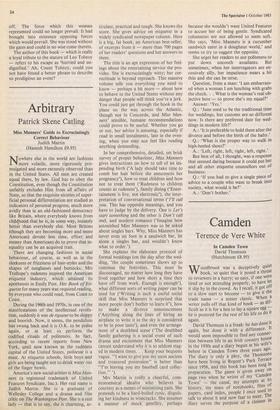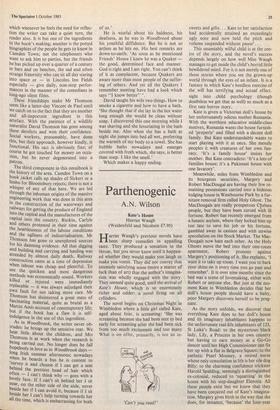Camden
Terence de Vere White
In Camden Town David Thomson (Hutchinson £8.95)
oodbrook was a deceptively quiet Vhf book, so quiet that it posed a threat to reviewers in a hurry; so easy, if one were tired or not attending properly, to have let it slip by in the crowd. As I recall, it got off to a slow start to become — to give it the trade name — a minor classic. When a writer pulls off that kind of book — as dif- ficult as it is for a hen to lay a square egg he is pestered for the rest of his life to do it again. David Thomson is a freak: he has done it again, but done it with a difference. It would seem impossible to find any connec- tion between life in an Irish country house in the 1930s and a diary begun at his wife's behest in Camden Town three years ago. The diary is only a ploy, the Thomsons have been living in Regent's Park Terrace since 1956, and this book has been long in preparation. The game is given away on page two when he writes of my 'Camden Town' — the canal, my attempts at its history, my mass of notebooks, files of papers, card index, people I once used to talk to about it and now fear to meet. The diary serves the purpose of a cloister in
which whenever he feels the need for reflec- tion the writer can take a quiet turn, the reader also. It is but one of the ingredients in the book's making; another is the potted biographies of the people he gets to know in Camden Town; not the telephoners who want to ask him to parties, but the friends he has picked up over a quarter of a century in bars and on benches, the sad and often strange fraternity who can sit all day staring into space or — in Lincolns. Inn Fields
especially — give daily, non-stop perfor- mances in the manner of the comedians in long-ago silent films.
These friendships make Mr Thomson seem like a latter-day Vincent de Paul until we catch on to the fact that they are another and all-important ingredient in this artefact. With the patience of a wildlife naturalist David Thomson has gone among these derelicts and won their confidence. Social workers, presumably, have done this, but their approach, however kindly, is functional. His tact is obviously fine; of course he got touched for money on occa- sion, but he never degenerated into a patron.
The third component in this omnibook is the history of the area. Camden Town on a book jacket calls up shades of Sickert or a limbo for Bloomsbury rejects; there is not a whisper of any of that here. We are led through the inhuman origins of the massive engineering work that was done in this area in the construction of the waterways and railways for getting the produce of England Into the capital and the manufactures of the capital into the country. Ruskin, Carlyle and others protested in their time against the heartlessness of the labour conditions and the ugliness of industrialisation. Mr Thomson has gone to unexplored sources for his damning evidence. All that digging and building and carrying and hauling was attended by almost daily death. Railway construction came at a time of depression when labour was cheap and plentiful. To use the quickest and most dangerous methods was economically sound. Workers killed or injured were immediately replacable — it was always adjudged their own fault for not taking more care. Mr Thomson has disinterred a great mass of fascinating material, quite as brutal as a Martin Amis account of contemporary life; but if the book has a flaw it is self- indulgence in the use of this ingredient.
As in Woodbrook, the writer never ob- trudes: he brings up the sensitive rear. We hear little about the children, and Mrs Thomson is at work when the research is being carried out. No longer does he fall hopelessly in love as in Woodbrook days long Irish summer afternoons; nowadays
`survey he boards a bus he is content to survey it and choose if I can get a seat behind the prettiest head of hair which often — I can't think why — goes with a lovely face. If I can't sit behind her I sit near, on the other side of the aisle, never beside her if 1 can avoid it, because if I sit beside her I can't help turning towards her all the time, which is embarrassing for both of us.'
He is wistful about his baldness, his deafness, as he was in Woodbrook about his youthful diffidence. But he is not so artless as he lets on. His best remarks are down-to-earth. 'As soon as he mentioned Friends' House I knew he was a Quaker the good, determined face and manner. God is right and I am right. You can't think of it as complacent, because Quakers are aware more than most people of the suffer- ing of others. And yet all the Quakers I remember meeting have had a look which says "I know better" '.
David taught his wife two things. How to smoke a cigarette and how to have a bath. `She thought that if she lay in the hot water long enough she would be clean without soap. I discovered this one morning while I was shaving and she luxuriating in the bath beside me. Also when she has a bath at night she jumps into bed all wet, preferring the warmth of my body to a towel. She has bubble baths nowadays and emerges covered with froth which, she says, is better than soap. I like the smell.'
Which makes a happy ending.







































 Previous page
Previous page